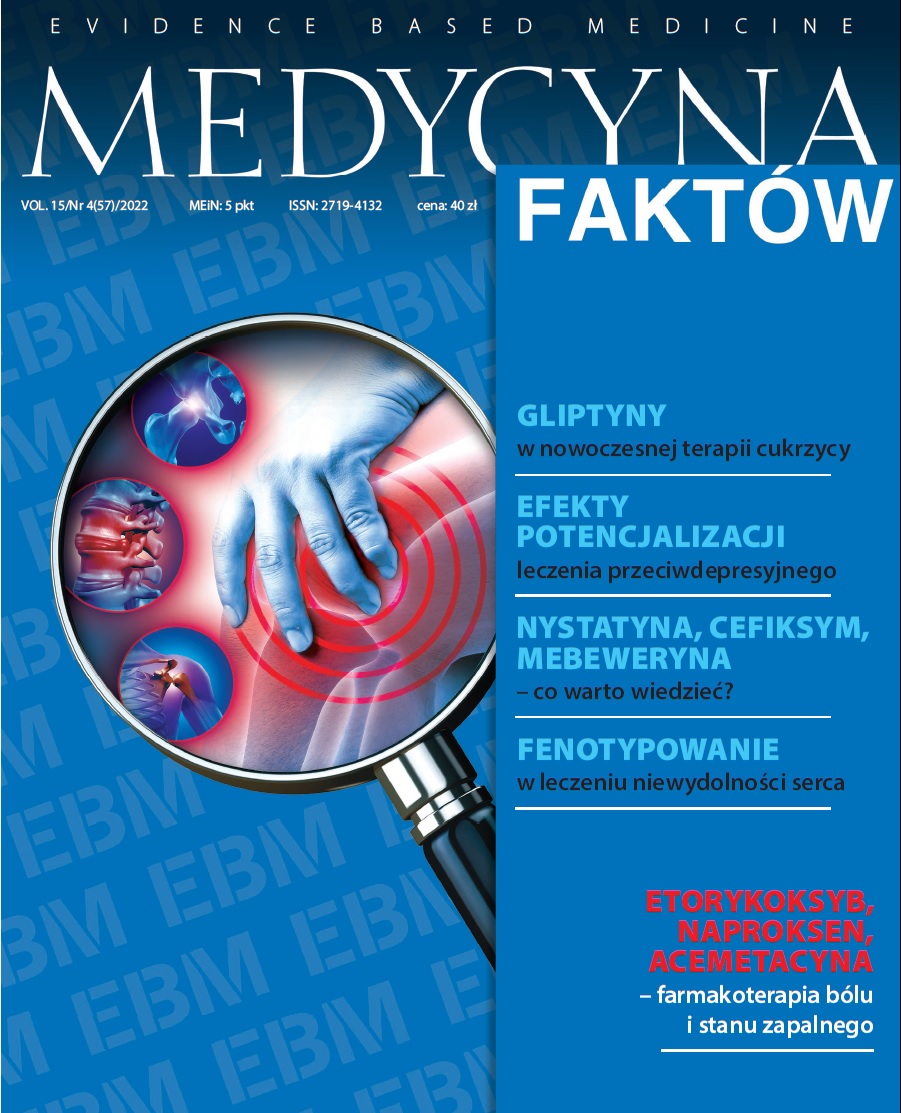Kiedy wybieram mebewerynę? Artykuł przeglądowy
##plugins.themes.bootstrap3.article.main##
Abstrakt
Zespół jelita drażliwego (IBS, irritable bowel syndrome) jest jednym z najczęstszych zaburzeń czynnościowych przewodu pokarmowego stanowiącym wciąż problem diagnostyczny i terapeutyczny. Aktualne dane naukowe w odniesieniu do farmakoterapii sugerują wysoką skuteczność leczenia rozkurczowego np. mebeweryną w połączeniu z innymi lekami prokinetycznymi i rozkurczowymi stosowanymi doraźnie oraz anksjolitykami w razie potrzeby, nie zapominając o indywidualnej diecie i modyfikacji stylu życia. IBS nadal stanowi wyzwanie diagnostyczne ze względu na dynamicznie zmieniający się obraz kliniczny i interdyscyplinarność choroby, jest rozpoznaniem z wykluczenia, w którym leczenie dostosowujemy do objawów aktualnie dominujących.
##plugins.themes.bootstrap3.article.details##
Copyright © by Medical Education. All rights reserved.
Bibliografia
2. Canon M, Ruiz AJ, Rondon M et al. Prevalence of irritable bowel syndrome and health related quality of life in adults aged 18 to 30 years in a Colombian University: an electronic survey. Am J Gastroenterol. 2017; 30: 67-75.
3. Sperber AD, Dumitrascu D, Fukudo S et al. The global prevalence of IBS in adults remains elusive due to heterogeneity of studies: a Rome Foundation working team literature review. Gut. 2017; 66: 1075-82.
4. Mulak A, Smereka A, Paradowski L. Nowości i modyfikacje w Kryteriach Rzymskich IV. Gastroenterologia Kliniczna. Postępy i Standardy. 2016; 8(2).
5. Drossman DA. Functional Gastrointestinal Disorders: History, Pathophysiology, Clinical Features and Rome IV. Gastroenterology. 2016; 150: 1262-79.
6. Lacy BE, Mearin F, Chang L et al. Bowel disorders. Gastroenterology. 2016; 150: 1393-407.
7. Van Oudenhove L, Levy R, Crowlel M et al. Biopsychosocial aspects of functional gastrointestinal disorders: how central and environmental processes contribute to the development and expression of functional gastrointestinal disorders. Gastroenterology. 2016; 150: 1355-67.
8. Qin H, Cheng C, Tang X et al. Impact of psychological stress on irritable bowel syndrome. World J Gastroenterol. 2014; 20: 14126-31.
9. Borghini F, Donato G, Alvaro D et al. New insights in IBS-like disorders: Pandora’s box has been opened; a review. Gastroenterol Hepatol Bed Bench. 2017; 10(2): 79-89.
10. Ford AC, Moayyedi P, Lacy BE et al. American College of Gastroenterology monograph on the management of irritable bowel syndrome and chronic idiopathic constipation. Am J Gastroenterol. 2014; 109(suppl 1): S2-26; quiz S27.
11. Pietrzak A, Skrzydło-Radomańska B, Mulak A et al. Rekomendacje diagnostyczno-terapeutyczne w zespole jelita nadwrażliwego. Gastroenterol Rev. 2018; 13(4): 167-96.
12. Daniluk J, Małecka-Wojciesko E, Skrzydło-Radomańska B et al. The efficacy of mebeverine in the treatment of irritable bowel syndrome – a systematic review. J Clin Med. 2022; 11: 1044.
13. Darvish-Damandi M, Nikifar S, Abdollahi M. A systematic review of efficacy and tolerability of mebeverine in irritable bowel syndrome. World J Gastroenterol. 2010; 16(5): 547-53.
14. Savarino E, Zingone F, Barberio B et al. Functional bowel disorders with diarrhoea: Clinical guidelines of the United European Gastroenterology and European Society for Neurogastroenterology and Motility. United European Gastroenterol J. 2022; 10(6): 556-84.
